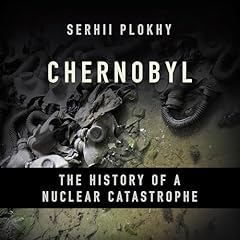
The Nuclear Disaster at Chernobyl
The Disaster Series
Failed to add items
Sorry, we are unable to add the item because your shopping cart is already at capacity.
Add to Cart failed.
Please try again later
Add to Wish List failed.
Please try again later
Remove from wishlist failed.
Please try again later
Adding to library failed
Please try again
Follow podcast failed
Please try again
Unfollow podcast failed
Please try again
$0.00 for first 30 days
LIMITED TIME OFFER
Get 3 months for $0.99/mo
Offer ends January 21, 2026 11:59pm PT
 Prime members: New to Audible? Get 2 free audiobooks during trial.
Prime members: New to Audible? Get 2 free audiobooks during trial.
Just $0.99/mo for your first 3 months of Audible Premium Plus.
1 audiobook per month of your choice from our unparalleled catalog.
Listen all you want to thousands of included audiobooks, podcasts, and Originals.
Auto-renews at $14.95/mo after 3 months. Cancel anytime.
Pick 1 audiobook a month from our unmatched collection.
Listen all you want to thousands of included audiobooks, Originals, and podcasts.
Access exclusive sales and deals.
Premium Plus auto-renews for $14.95/mo after 30 days. Cancel anytime.
Buy for $5.80
-
Narrated by:
-
The Staff at High Noon Books
-
By:
-
Robin Cruise
The Chernobyl power plant was the hope for energy in the Ukraine. Years after the 1986 meltdown, Ukraine is still feeling the effects of its radiation.
The Nuclear Disaster at Chernobyl is part of the Disasters series. These moments in history recall the death and destruction caused by both natural and manmade disasters around the world. The Disaster series probes the loss of the space shuttle Challenger's crew, the oil-well fires set in Kuwait by forces of Saddam Hussein's Iraq during the first Gulf War, the Korean airliner shot down by Russia in the Former Soviet Union, the nuclear meltdown at Chernobyl, and the Mount St. Helens eruption. This High-Interest, non-fiction series engages listeners of all ages.
©2008 High Noon Books (P)2008 High Noon BooksListeners also enjoyed...




















No reviews yet


